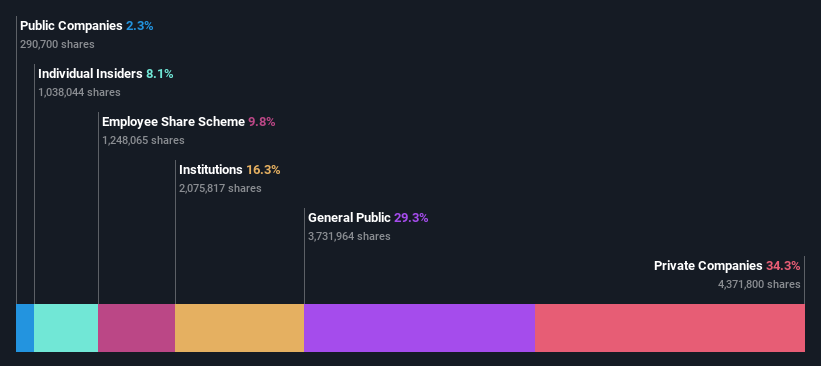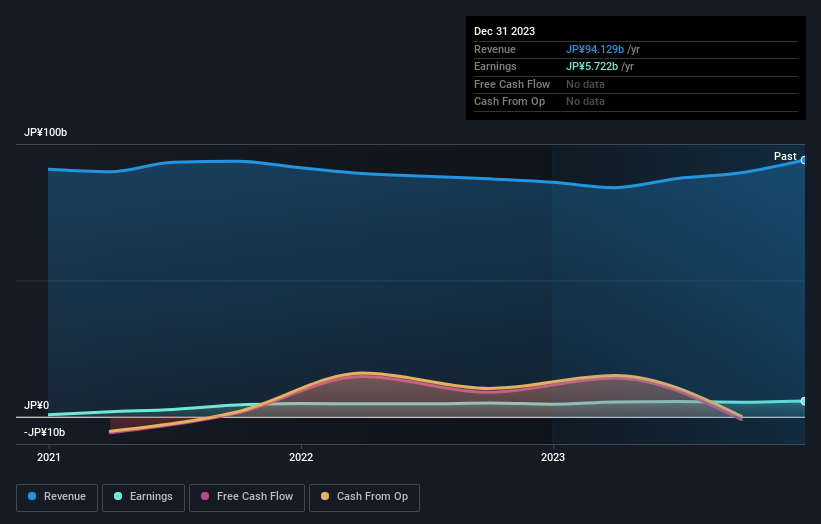Stock Analysis
- Japan
- /
- Construction
- /
- TSE:1888
Private companies invested in Wakachiku Construction Co., Ltd. (TSE:1888) copped the brunt of last week's JP¥5.0b market cap decline

Key Insights
- Significant control over Wakachiku Construction by private companies implies that the general public has more power to influence management and governance-related decisions
- 54% of the business is held by the top 4 shareholders
- Institutions own 16% of Wakachiku Construction
A look at the shareholders of Wakachiku Construction Co., Ltd. (TSE:1888) can tell us which group is most powerful. With 34% stake, private companies possess the maximum shares in the company. Put another way, the group faces the maximum upside potential (or downside risk).
As a result, private companies as a group endured the highest losses last week after market cap fell by JP¥5.0b.
Let's delve deeper into each type of owner of Wakachiku Construction, beginning with the chart below.
See our latest analysis for Wakachiku Construction

What Does The Institutional Ownership Tell Us About Wakachiku Construction?
Institutional investors commonly compare their own returns to the returns of a commonly followed index. So they generally do consider buying larger companies that are included in the relevant benchmark index.
Wakachiku Construction already has institutions on the share registry. Indeed, they own a respectable stake in the company. This suggests some credibility amongst professional investors. But we can't rely on that fact alone since institutions make bad investments sometimes, just like everyone does. If multiple institutions change their view on a stock at the same time, you could see the share price drop fast. It's therefore worth looking at Wakachiku Construction's earnings history below. Of course, the future is what really matters.

Wakachiku Construction is not owned by hedge funds. Our data shows that ASO Corporation is the largest shareholder with 34% of shares outstanding. In comparison, the second and third largest shareholders hold about 7.7% and 7.5% of the stock.
To make our study more interesting, we found that the top 4 shareholders control more than half of the company which implies that this group has considerable sway over the company's decision-making.
While studying institutional ownership for a company can add value to your research, it is also a good practice to research analyst recommendations to get a deeper understand of a stock's expected performance. We're not picking up on any analyst coverage of the stock at the moment, so the company is unlikely to be widely held.
Insider Ownership Of Wakachiku Construction
The definition of company insiders can be subjective and does vary between jurisdictions. Our data reflects individual insiders, capturing board members at the very least. The company management answer to the board and the latter should represent the interests of shareholders. Notably, sometimes top-level managers are on the board themselves.
Most consider insider ownership a positive because it can indicate the board is well aligned with other shareholders. However, on some occasions too much power is concentrated within this group.
We can see that insiders own shares in Wakachiku Construction Co., Ltd.. In their own names, insiders own JP¥3.5b worth of stock in the JP¥43b company. Some would say this shows alignment of interests between shareholders and the board. But it might be worth checking if those insiders have been selling.
General Public Ownership
The general public-- including retail investors -- own 29% stake in the company, and hence can't easily be ignored. While this group can't necessarily call the shots, it can certainly have a real influence on how the company is run.
Private Company Ownership
Our data indicates that Private Companies hold 34%, of the company's shares. It's hard to draw any conclusions from this fact alone, so its worth looking into who owns those private companies. Sometimes insiders or other related parties have an interest in shares in a public company through a separate private company.
Next Steps:
It's always worth thinking about the different groups who own shares in a company. But to understand Wakachiku Construction better, we need to consider many other factors. Consider for instance, the ever-present spectre of investment risk. We've identified 1 warning sign with Wakachiku Construction , and understanding them should be part of your investment process.
Of course this may not be the best stock to buy. Therefore, you may wish to see our free collection of interesting prospects boasting favorable financials.
NB: Figures in this article are calculated using data from the last twelve months, which refer to the 12-month period ending on the last date of the month the financial statement is dated. This may not be consistent with full year annual report figures.
Valuation is complex, but we're helping make it simple.
Find out whether Wakachiku Construction is potentially over or undervalued by checking out our comprehensive analysis, which includes fair value estimates, risks and warnings, dividends, insider transactions and financial health.
View the Free AnalysisHave feedback on this article? Concerned about the content? Get in touch with us directly. Alternatively, email editorial-team (at) simplywallst.com.
This article by Simply Wall St is general in nature. We provide commentary based on historical data and analyst forecasts only using an unbiased methodology and our articles are not intended to be financial advice. It does not constitute a recommendation to buy or sell any stock, and does not take account of your objectives, or your financial situation. We aim to bring you long-term focused analysis driven by fundamental data. Note that our analysis may not factor in the latest price-sensitive company announcements or qualitative material. Simply Wall St has no position in any stocks mentioned.
About TSE:1888
Wakachiku Construction
Wakachiku Construction Co., Ltd. engages in construction and real estate businesses.
Solid track record with adequate balance sheet and pays a dividend.

